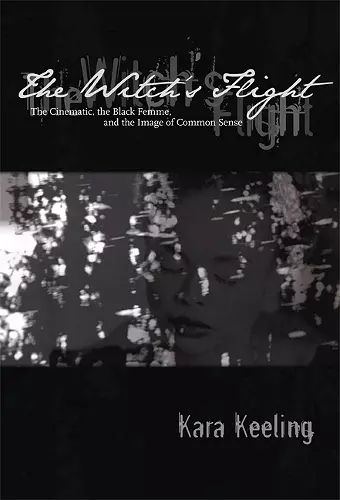The Witch's Flight
The Cinematic, the Black Femme, and the Image of Common Sense
Format:Paperback
Publisher:Duke University Press
Published:5th Nov '07
Should be back in stock very soon

Highlights the ways "the cinematic" structures both racist and sexist portrayals, and their potential undoing
Contends that cinema and cinematic processes had a profound significance for twentieth-century anti-capitalist Black liberation movements based in the United States. The author finds hidden within the histories and logics generated by US-based struggles against racism, sexism, and homophobia, the Black femme's invisible, affective labour.Kara Keeling contends that cinema and cinematic processes had a profound significance for twentieth-century anticapitalist Black Liberation movements based in the United States. Drawing on Gilles Deleuze’s notion of “the cinematic”—not just as a phenomenon confined to moving-image media such as film and television but as a set of processes involved in the production and reproduction of social reality itself —Keeling describes how the cinematic structures racism, homophobia, and misogyny, and, in the process, denies viewers access to certain images and ways of knowing. She theorizes the black femme as a figure who, even when not explicitly represented within hegemonic cinematic formulations of raced and gendered subjectivities, nonetheless haunts those representations, threatening to disrupt them by making alternative social arrangements visible.
Keeling draws on the thought of Frantz Fanon, Angela Davis, Karl Marx, Antonio Gramsci, and others in addition to Deleuze. She pursues the elusive figure of the black femme through Haile Gerima’s film Sankofa, images of women in the Black Panther Party, Pam Grier’s roles in the blaxploitation films of the early 1970s, F. Gary Gray’s film Set It Off, and Kasi Lemmons’s Eve’s Bayou.
“Kara Keeling offers a tour de force extension of Deleuze’s writings: she understands cinema as a form of thought, as well as a motor of a shared sensorium, capable of numbing repetition as well as provocative alternative visions. No ‘Deleuzeobabble’ here, though, just sweet grooves and careful readings. With lucid and piercing argument, Keeling is a serious critic of black visual culture, following a line of powerful litanies for survival from Frantz Fanon to Angela Davis to Fred Moten.”—Amy Villarejo, author of Lesbian Rule: Cultural Criticism and the Value of Desire
“There is a special alchemy at work in this wonderful project that transforms painstaking research and original theoretical insight into a superb understanding of the cinematic’s deeply cathected relation to blackness, gender, and sexuality. Kara Keeling watches, reads, and stitches together a tapestry that teaches us how to re-read and re-think what we thought we knew already of visual culture, of the peculiarities of our social order’s self-imagination, and of the survival of black femme desire.”—Wahneema Lubiano, editor of The House that Race Built
“Methodologically, The Witch’s Flight fits squarely on the shelf with other film, visual, and media studies scholarship while also straddling critical U.S. historiography, queer theory, women’s studies, and critical race studies. And yet, its methodology represents more than an example of interdisciplinarity precisely because it uniquely embodies a field of thought working to understand its own implication in reproducing global capitalism, neoliberalism, and the ruse of representation.” -- Stacy I. Macías * GLQ *
"[A] rich, provocative, deeply personal book. . . . Keeling's work is revelatory and refreshing; this is a book that continually engages the reader. Highly recommended.” -- G. A. Foster * Choice *
"Keeling’s book is an astonishing example of how to do things with film and feminism.... Evidence that feminist film theory not only changes how you see the world, but changes the world itself." -- Sophie Mayer * British Film Institute *
ISBN: 9780822340256
Dimensions: unknown
Weight: 340g
224 pages